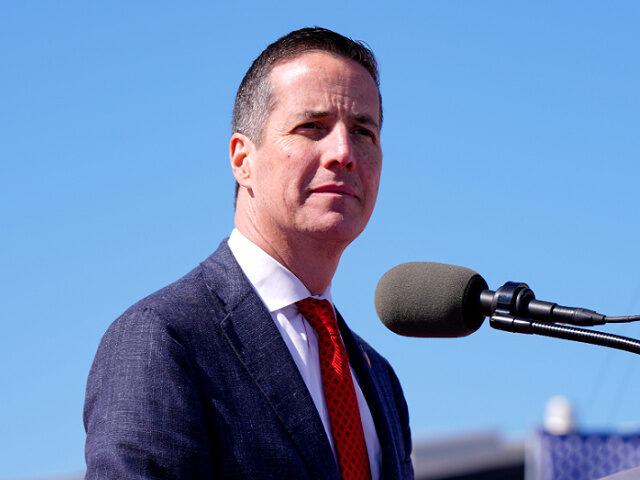The Associated Press (AP) is feeling the pressure as an organization after the newswire service published an attack piece on Ohio Senate candidate Bernie Moreno.
The heavy scrutiny follows the article’s publication on Thursday evening, and since then, key elements of it have collapsed. Now, several U.S. senators, attorneys, and other high-profile conservatives are publicly questioning if the AP has opened itself up to legal liability should Moreno move to sue the organization.
The gist of the problem for the AP is as follows:
In two separate pieces, the AP revealed that Moreno’s email account was used more than a decade ago to create a salacious Adult Friend Finder account. The Moreno team responded to the AP prior to its publication with the revelation that while the account was in fact made, it was created by a then-intern for Moreno. That intern has signed a document taking responsibility for creating the account and claiming he did so as a prank. Another executive at one of Moreno’s companies confirmed the then-intern had access to Moreno’s email account and that his duties as an intern included regularly checking Moreno’s email account.
While the AP reported as much, its articles cast heavy doubt on this explanation — both in its original two pieces and in social media postings from AP reporter Brian Slodysko, whose byline is on the two articles. Slodysko in his social posts did not include this exculpatory evidence and entirely plausible explanation for why and how the account was originally created.

Bernie Moreno, Republican candidate for Senate, attends the Columbiana County Lincoln Day Dinner in Salem, Ohio, on Friday, March 15, 2024. (Bill Clark/CQ-Roll Call, Inc via Getty Images)
What’s more, as Breitbart News reported on Saturday evening, the two original AP pieces also — in an apparent effort to further link Moreno himself to the account that Moreno’s then-intern says he made as a prank — used the phrase “geolocation data” in an effort to show the “account was set up for use in a part of Fort Lauderdale, Florida, where property records show Moreno’s parents owned a home at the time.”
The issue now centers heavily around the AP’s use of the term “geolocation data.”
On Saturday, the founder of Adult Friend Finder publicly came out and said the only location information associated with accounts created in 2008 on his site were latitude and longitude coordinates based off the self-reported zip code of whoever created the account. That means whoever set up the account could have done so from anywhere in the world and the account would have had the same location information because it was based off the zip code the user entered. So, in fact, there was no “geolocation data” associated with this account as that term is commonly understood, nor as that term is defined in the AP’s own style guide.
When originally confronted with these inconsistencies on Saturday, the Associated Press’s spokeswoman Lauren Easton sent back to Breitbart News a tweet thread from the Adult Friend Finder founder that confirms the Associated Press does not in fact have such “geolocation data” and that the location information associated with the account in question was in fact based off the zip code manually entered by whoever created the account. Easton later, after publication of the Breitbart News story, tried to use the official corporate communications account of the Associated Press to deny she did this and to demand a correction from Breitbart News. To set the record straight Breitbart News updated its original story by publishing full screenshots of the entire back-and-forth with Easton on Saturday showing exactly what she communicated.
Now, throughout the evening on Saturday after the initial publication of the Breitbart News investigation into the AP’s articles — and throughout the day on Sunday — several high-profile figures including top lawmakers like Sens. J.D. Vance (R-OH) and Mike Lee (R-UT) as well as some leading attorneys have raised questions about whether the AP opened itself up to legal liability on this front.
On Saturday evening, several top conservatives criticized the AP:
The AP admits its garbage hit piece against Bernie Moreno was based on “geolocation” data that doesn’t exist. https://t.co/yJVnQjdJU7
The AP must retract or at least correct its story. This is a major scandal.
— J.D. Vance (@JDVance1) March 17, 2024
Exclusive—AP Admits It Has No ‘Geolocation Data’ to Back Up Moreno Smear
Lauren Easton, the director of communications for the AP …. , “it does not have “geolocation data” as the two articles it previously published originally claimed.” UNBELIEVABLE!
https://t.co/SbxvJI5wTm— Sara A. Carter (@SaraCarterDC) March 17, 2024
🚨🚨🚨
Exclusive — Associated Press Admits It Has No ‘Geolocation Data’ to Back Up Bernie Moreno Smearhttps://t.co/mtMjWqk3gZ
— Donald Trump Jr. (@DonaldJTrumpJr) March 17, 2024
It’s official. The @ap needs to be sued now.
The media must face consequences for knowingly publishing fake news. https://t.co/Ysz8BYVFzK
— Richard Grenell (@RichardGrenell) March 17, 2024
Vance kicked things off early on Sunday by tweeting a screenshot back at the AP’s corporate communications account showing that Easton did in fact tell Breitbart News that the AP does not have the “geolocation data” it originally claimed to have:
In defense of your story, you point to a thread that explicitly shows the opposite of what you claim.
"Geolocation data" is a term with a specific meaning. Your reporter misused that term, and I demand a correction. https://t.co/beSvFXVQuq pic.twitter.com/H0JPho8Dtk
— J.D. Vance (@JDVance1) March 17, 2024
Donald Trump Jr., former President Donald Trump’s eldest son, then sent the AP the dictionary definition of “geolocation” and noted that what the AP published does not meet that definition:
Here is the dictionary definition of "geolocation." Provide the proof that "geolocation data" exists for the account like you claimed or correct your story.
And if you can't provide proof, the only real question becomes, was this negligence or malice from the @AP? https://t.co/lZMZZ6KubF pic.twitter.com/zGRzqdcu82
— Donald Trump Jr. (@DonaldJTrumpJr) March 17, 2024
Others, too, castigated the AP for the mistake:
Lauren Easton said that. Have you fired her?
— Raheem. (@RaheemKassam) March 17, 2024
It’s malice. The AP is just another example of state run media propaganda. https://t.co/GIs3S2AgYY
— Sean Parnell (@SeanParnellUSA) March 17, 2024
Watching the @AP get absolutely destroyed for its sloppy and unethical reporting has made for a surprisingly satisfying weekend. https://t.co/cuv1Ghf6Sf
— Taylor Budowich (@TayFromCA) March 17, 2024
@AP_CorpComm: Then stop talking and provide your proof that you have geolocation. "Accurate and deeply reported" means zero if you don't have receipts. Show the receipts.
— jackwindsor (@jackwindsor) March 17, 2024
Sue @AP out of existence. https://t.co/YmXJGPqbXX
— Gregg Keller (@RGreggKeller) March 17, 2024
Vance, meanwhile, kept the heat up all day:
The fact that the AP used a term, "geolocation data" that has no basis in reality, and is contradicted by the founder of the website in question, is a scandal for journalism. The fact you refuse to issue a correction is libelous.
— J.D. Vance (@JDVance1) March 17, 2024
You cannot make this up. The AP published a bogus, easily verifiable falsehood. When asked for evidence, they pointed to a Twitter thread that shows their reporting was wrong.
Why is the AP lying about Bernie Moreno? Because they fear him. Vote Bernie Moreno on Tuesday! https://t.co/EAEAUxPtvf
— J.D. Vance (@JDVance1) March 17, 2024
Jonathan Turley, a top constitutional attorney, then weighed in saying the AP may have opened itself up to serious litigation:
There is a possibility of a lawsuit by GOP candidate Bernie Moreno over what is being denounced as a "hit piece" by AP on the eve of the Ohio primary. If Moreno sues and gains access to discovery, this could prove costly and embarrassing for the company. https://t.co/0W2IxrPRSr
— Jonathan Turley (@JonathanTurley) March 17, 2024
Other attorneys zoned in on this as well:
If a court finds that this disgraceful behavior by the @AP doesn’t constitute actual malice, then @berniemoreno needs to ask the courts to overturn NYT v. Sullivan.
Sullivan single-handedly made peddling falsehoods a profitable media business model; it’s a cancer on the country. https://t.co/6zrzCbyeGt
— Jonathan McPike (@JonathanMcPike) March 17, 2024
Then, Vance found the Associated Press’s Style Guide definition of “geolocation,” which the senator says does not match what the Associated Press published in these Moreno stories:
Here’s the AP style guide’s definition of geolocation. Given that the founder of the website and your own reporting indicate that there is no metadata that bears on location, will you be amending your hit piece or amending your style guide? https://t.co/7nEWkvVe3x pic.twitter.com/1ATWw8xMzj
— J.D. Vance (@JDVance1) March 17, 2024
Other prominent conservative attorneys like Mike Davis then highlighted this point as well:
The AP ran a flimsy smear job on Bernie Moreno days before the primary.
It claimed it had “geolocation data" to back up its piece.
Not only does it turn out that it didn’t, but it ignored its own style guide defining “geolocation” to smear him.
That’s actual malice. https://t.co/YEiIQZtYEx
— 🇺🇸 Mike Davis 🇺🇸 (@mrddmia) March 17, 2024
And later in the day, Lee weighed in, becoming the second U.S. senator to hammer the AP on this front:
This is actionable defamation.
And even though Moreno is public figure and would therefore have to show that AP acted with reckless disregard for the truth—based on the Supreme Court’s 1964 flawed ruling in New York Times v. Sullivan—Moreno might well win under that standard. https://t.co/DXGtYA3nnM
— Mike Lee (@BasedMikeLee) March 17, 2024
Meanwhile, other top conservatives and communications industry professionals pointed out the major issues facing the AP right now:
I know a bit after 40 years in press relations and several futile client libel suits against dishonest media. By violating their own Styleguide @AP has clearly acted with malice. This could cost them MILLIONS.
Cub reporter @BrianSlodysko will have to sell his Pokémon collection. https://t.co/ssQ4FQacw4
— Michael R. Caputo (@MichaelRCaputo) March 17, 2024
Shocking journalistic sins seem to have been committed by AP, if this is halfway accurate. What a sad downfall for a once admired institution. https://t.co/xQ7g4RGga8
— Miranda Devine (@mirandadevine) March 17, 2024
Apparently, the AP is facing problems internally as a result of this:
I have heard that AP executives are freaking out about their massive mistake.
They need to be sued for this reckless attempt at election interference. https://t.co/wXin0q2QlC
— Richard Grenell (@RichardGrenell) March 16, 2024
I talked to a senior AP reporter Saturday. Can confirm. https://t.co/3PcPFFXOj9
— Michael R. Caputo (@MichaelRCaputo) March 17, 2024
What happens next remains to be seen but the bar for a public official winning a defamation suit is extremely high.

COMMENTS
Please let us know if you're having issues with commenting.